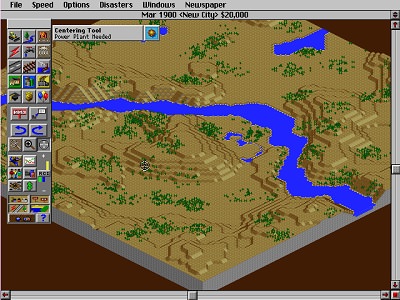SimCity 2000
Your detailed description paints a vivid picture of "SimCity 2000," the sequel to the groundbreaking "SimCity" game, which is a city-building simulation game where players act as the mayor tasked with building and managing a metropolis. It builds upon the original game's premise by introducing several new features and improvements:
-
Isometric Projection: This new view replaced the top-down perspective of the original game, offering a three-dimensional look and allowing for more detailed graphics and cityscapes.
-
Varied Geography: Players now had to contend with varied terrain such as hills and mountains, affecting city planning and infrastructure development.
-
Water Management: A new layer of complexity was added with the introduction of water supply systems, requiring players to build and manage water pumping, treatment, and distribution.
-
Improved Transportation: Beyond roads, the game added highways, bus depots, railways, and subway systems to address traffic congestion.
-
Diverse Power Plants: The options for power generation were expanded, with each type of power plant having distinct cost, pollution, and efficiency characteristics.
-
Flexible Zoning: Zoning became more flexible, allowing for arbitrary shapes and sizes, along with the option to choose between dense and light zoning.
-
Expanded Services: Health care and education joined police and fire services as necessary amenities for city residents, impacting city development and land value.
-
Recreational Areas: The game allowed for more diverse recreational options, including parks, zoos, and marinas.
-
Achievement Buildings: As the city reached certain milestones, players could unlock special buildings that enhanced the city's appeal and functionality.
-
Detailed Budgeting: A more detailed budget system provided insight into city finances, enabling better management and planning.
-
Special Urban Projects: Players could implement special programs and projects to improve various aspects of city life, like safety and aesthetics.
-
Disaster Management: The "Disaster" menu allowed players to manage and mitigate disasters actively, with options to deploy emergency services during events.
-
Scenarios: A selection of pre-built cities with specific challenges were available, adding to the game's replayability.
"SimCity 2000" wasn't just a game about building a city; it was a simulation that allowed players to experiment with urban planning and management concepts, learning about the intricacies of running a city. The success of the game showed that there was significant interest in non-combat, creative simulation games, a genre that continues to be popular today with successors and similar games like "Cities: Skylines."
The game was a testament to the idea that what might seem boring or mundane in real life, such as urban planning and infrastructure management, can become engaging and entertaining when turned into a game. The success of "SimCity 2000" thus reinforced the notion that gamers often enjoy experiences that allow them to create, manage, and problem-solve in complex systems, even if these experiences are rooted in everyday tasks and roles.

kittytoe
- 02-03-2021 14:29:07